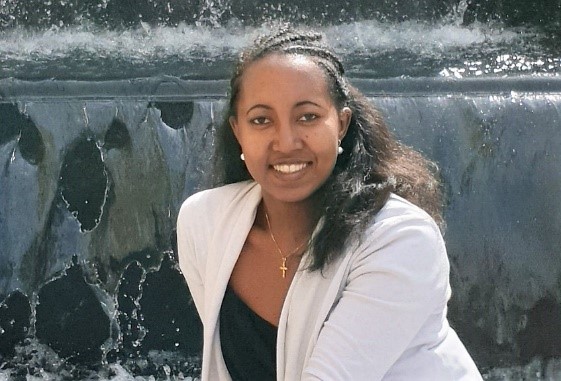ESR 3: Water scarcity and migration in East Africa
Early Stage Researcher: Sinafekesh Girma Wolde
Host institution: Politecnico di Milano, Italy
Principal supervisor: Prof. Maria Cristina Rulli
Co-supervisor: Prof. Paolo D’Odorico
Non-academic co-supervisor: tbc
"My research aims to replete the immense information gap in understanding the relationship between water resources availability, climate change, and migration in East Africa."
Topic
Estimations of expected environmental migrants by 2050 range from 25 million to 1 billion (UNU-EHS, 2015). The World Water Development Report 2016, highlights there is a “clear connection between water scarcity, food insecurity, social instability and potentially violent conflicts, which in turn can trigger and intensify migration patterns throughout the world”. Although the knowledge on global environmental change, including climate change, as drivers of migration is increasing, there is a strong information gap in understanding how water resource availability influences migration. With the aim of identifying the role of water (i.e. hydrological extremes) in human migration and understanding possible future migration patterns in 5 countries of East Africa, this project will analyse and assess a) the main drivers of migration through meta-analysis/systematic review; b) water scarcity at fine temporal and spatial scale in current and future scenario; c) evolution of migration patterns associated to projected changes of water scarcity.
This research project will:
- Identify the main drivers of migration that underlie the migration behaviour in Ethiopia, Somalia, Kenya, Tanzania, and Rwanda through conducting a meta-analysis/systematic review of migration studies;
- Assess and compare the level of water scarcity within the mentioned countries by using a set of carefully selected hydrological indicators;
- Compare the evolution of migration behaviour with the evolution of water scarcity to identify possible interrelations and potential impacts of specific hydrological events on migration;
- Develop an analytical framework to classify the drivers of migration identified in (1) according to their relation to water scarcity, including a categorization into direct and indirect relations;
- Draw conclusions on future scenarios of changing migration patterns based on projected changes in the level of water scarcity.
Expected results:
- Identification of drivers of migration-related to water scarcity (both directly and indirectly) in East Africa;
- Assessment of the impact of specific hydrological events on migration that provides knowledge on the response time of migration to changes in the level of water scarcity;
- Knowledge of future migration patterns based on the projected evolution of water scarcity levels in the mentioned countries.
About Sinafekesh Girma Wolde
Sinafekesh is a Junior Integrated Water Resource Manager; Civil Engineer specialized in holistic research development and implementation. She is an early career researcher experienced in the areas of sustainable natural resources management, DAFNE approach for management of land, water, energy, and climate nexus, agricultural water use efficiency in rainfed and irrigated schemes, remote sensing data analysis, water scarcity, integrated planning for climate change, and biodiversity, science communication skills for water cooperation and diplomacy, transboundary watershed inventory, small to large scale rainwater harvesting systems, water resource management, sustainable development goals, project planning, monitoring and evaluation, and WASH.
She is currently a Ph.D. research fellow in the Department of Civil and Environmental Engineering at the Politecnico di Milano university. Her research focuses on identifying the role of extreme hydrological events in human migration and understanding the possible future migration patterns in Ethiopia, Kenya, Somalia, Tanzania, and Rwanda. The research aims to identify the drivers of migration and assess the level of water scarcity in the above countries. She has a strong background in leadership, communication, organization, community mobilization, and project management from her work with pastoralist communities in Kenya, civil war refugees from South Sudan, and voluntary work with local and international organizations in Ethiopia and Kenya. She also contributed to the publication of the UN Environment's GEO-6 for Youth in Africa and the smart water management case study by the IWRA.
LinkedIn profile: Sinafekesh Girma
Contact
Sinafekesh Girma Wolde
NEWAVE Early Stage Researcher, Ph.D. Candidate
Politecnico di Milano, Italy
Website: www.polimi.it
Prof. Maria Cristina Rulli
Full professor, Department of Civil and Environmental Engineering
Politecnico di Milano, Italy
Website: www.polimi.it
Prof. Paolo D'Odorico
Professor, Department of Environmental Science, Policy, & Management
University of California, Berkeley, United States
Website: www.ourenvironment.berkeley.edu




